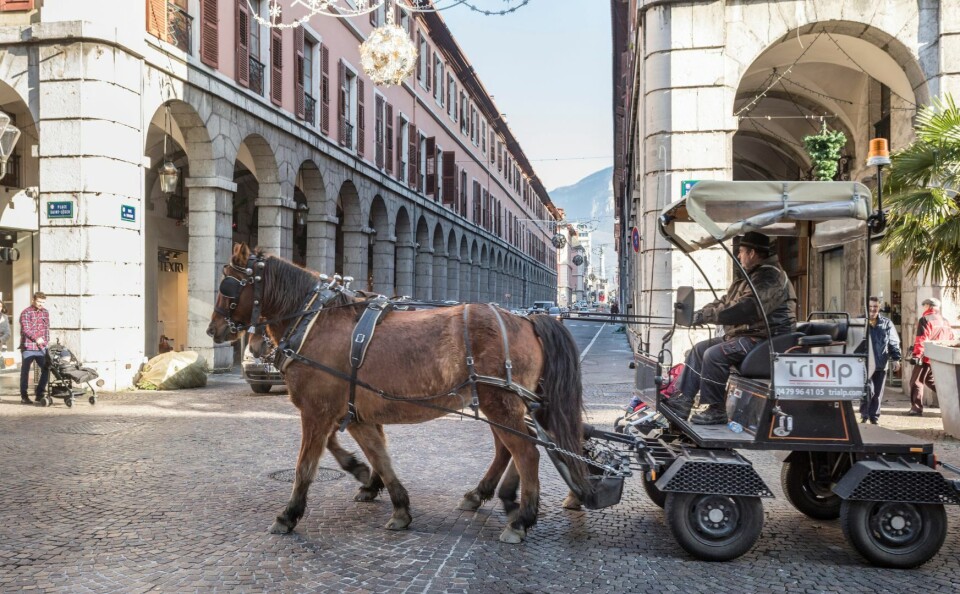-
How to dispose of your Christmas tree in France in 2026
Dumping an old tree on the pavement, in a park or in woodland is illegal, and can result in a fine
-
Christmas gifts: from what sum must they be declared to French tax office
The process for declaration is moving fully online from January 2026
-
What to do if Christmas parcels in France arrive late or damaged?
There are various routes to follow dependent upon the issue
Cart horses collect Christmas trees and ‘bring joy’ across France
Around 200 towns use horse-drawn carts to collect recycling, take children to school or senior citizens to market

On Sunday, January 8, 2023, residents in Aix-les-Bains (Savoie) will be taking their Christmas trees out to be collected by a horse-drawn cart.
“It’s the fifth year we’re collecting the trees,” says Patrick Gautier of Trialp, the ‘entreprise d’insertion’ organising the event. “We are also collecting trees in Chambéry on January 7 and 14.”
Read more: Savoie: Christmas trees collected with help of horse-drawn carriages
The two geldings providing the horsepower are called Capitole and CasseCou.
Both 14 years old, they weigh around 650 kilos each and are Freibergers, also known as Franches-Montagnes, a breed originally from Switzerland widely used in the past as a draft and pack horse by the Swiss army.
“In the summer, from mid-May to mid-September we use them in Aix-les-Bains to collect cardboard boxes from shops for recycling.
The person who actually throws the boxes into the cart is the same person who works with the lorry for the rest of the year and he says when they see it’s a horse, they turn the motor off, get out and take photos. When it’s the recycling truck, they hoot and shout.”
Read more: Eight ideas for what to do with your old Christmas tree in France
Read more: Gardening in France: French history and care of Christmas trees
Horse-drawn carts take children to school
The same thing has been noted all over France, as around 200 towns have begun using horse-driven vehicles.
In Hennebont, Brittany, two heavy horses, Dispar and Circus, pull carts to collect rubbish, take children to and from the canteen, the library and after-school club, and take senior citizens to the market.
In the summer, they offer sightseeing rides to tourists.
In Vendargues (Hérault) two carts (called hippobuses) take 120 children to five different primary schools each day. The free service is so over-subscribed that there is a waiting list for places.
Read more: Riding centres in France struggle to find horses
It is not simply nostalgia
Horses are quieter and less polluting than trucks. They also bring more intangible benefits.
“Horses make social links. As people come out to admire the horses and pat them, they also talk to each other, get to know each other. They smile. Sometimes people who haven’t spoken for months, will start talking to the horses in whole sentences. The horses bring joy,” says Patrick Gautier.
Councils have also noted that when horses collect Christmas trees, people put them out on time.
When they do polls, more people fill in forms if they are distributed from a horse and cart.
Children attend school more regularly.
“More people put boxes out for recycling when we collect them with horses. Horses also calm the traffic. Drivers slow down.”
He points out that with modern equipment, the work for the horses is less taxing than in the past. The carts have the same brakes as vehicles, and the combination of inflated tyres and tarmac roads means the work is easier, and the horses, which work around two hours a day, are regularly checked by vets to ensure they are in good health.
Related articles
How rubbish collections and fees are changing in south west France
Holidays are ending but France’s winter fun is hopefully just starting
Cadre Noir de Saumur: Discover France’s unique style of horse riding
























